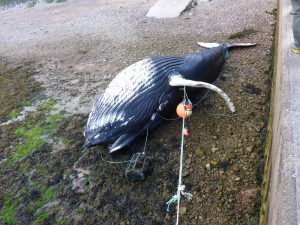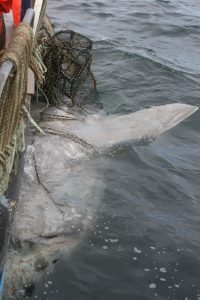A GROUND-BREAKING project is helping to reduce the deaths of whales and other sea creatures in Scottish waters.
NatureScot has published a report today, on the first phase of the Scottish Entanglement Alliance (SEA) project.
The project is the first of its kind in the UK and brings together creel fishers, NatureScot, research scientists and marine mammal conservation and rescue charities to reduce deaths caused by large sea creatures getting tangled in nets.

A recent increase in marine entanglement in Scotland has sparked concern for animal welfare and conservation.
The Scottish Marine Animal Stranding Scheme (SMASS) reported an increase of entanglement cases in Scottish waters from four in 2014 to 18 in 2018.
SMASS also reported that eight cases of entanglement have been reported in 2021 so far. With fishers now legally obligated to report entanglements.
The project involved interviewing 159 creel fishers about their fishing practises and experiences of entanglement. The interviews revealed a total of 146 entanglements were reported over a 10-year period, with only a small number of these previously known.
Dr Kirstie Dearing, NatureScot’s Fisheries Advisor commented on the project: “We all find it upsetting to see our majestic marine species in distress, so we’re really heartened by the strong commitment and willingness of the fishing industry to work towards practical, safe and sustainable solutions on the issue of entanglement.
“We will only solve this problem by working in collaboration on potential legislative changes. The new reporting obligation will also help us to understand the extent of the issue more clearly.”
As part of the SEA project, fishers also participated in training events and workshops to help promote best fishing practises and reduce the risk of marine entanglement.
This training has given fishers the ability to rely on each other for help and safely provide a rapid response to aid any entangled animals.

The report also recommends a number of ways to combat marine entanglement. Including trials of weighted ropes, tighter regulations to the amount of gear in the water and a cap on creel numbers, all of which were supported by fishers in the study.
Bally Philip from the Scottish Creel Fisherman’s Federation (SCFF) said: “The SCFF are proud to have taken part in this study which is at the forefront of understanding and finding mitigations for tackling the global problem of marine animal entanglement in fishing gear.
“We look forward to collaborating with our partners on sourcing funding for the next phase of this project, which will be able to research and develop equipment and strategies to reduce entanglement of cetaceans [marine mammals] and sharks in our fisheries.”
NatureScot are currently looking at funding opportunities for SEA phase two. This would extend the research over a wider geographical area and examine entanglements in other types of fishing gears commonly used in the UK. It would also include further research on how fishing can be modified, as well as looking at the most high-risk areas and times for fishers to avoid.

